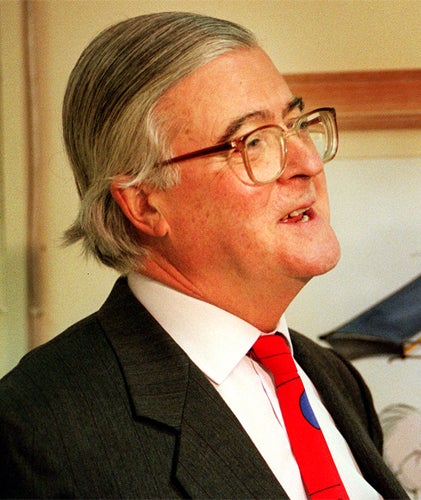Baker tells Gove he wants to take over failing schools

Plans to take over 20 failing schools and turn them into new technology colleges for 14 to 19-year-olds were unveiled by the former Education Secretary Kenneth Baker yesterday.
Lord Baker made the proposal at a breakfast meeting with Education Secretary Michael Gove and Schools Minister Nick Gibb yesterday.
The Conservatives have already agreed to open 12 University Technical Colleges, each one being sponsored by a university and further education college, and the 20 Lord Baker wants would be in addition.
Lord Baker, a Conservative peer who set up a trust three years ago with the late Lord Dearing – former head of the Post Office – to mastermind the scheme, has set a target of opening 100 of the new-style schools. Two will open this September and three more before 2012. The idea is that UTCs would specialise in practical studies in the morning – such as engineering – and academic lessons such as English, maths and science in the afternoon.
Already 32 institutions – including Cambridge, Warwick and Bristol universities (all members of the Russell Group, which represents leading research institutions in the UK) have expressed an interest in sponsoring a UTC. Lord Baker told Mr Gove: "You have 200 failing (secondary) schools. Give me 20 by the end of the year and we will close them and open them up as University Technical Colleges."
Speaking later at a conference organised by Career Academies UK, a charity set up to bring business and education closer together, he added that earlier attempts to set up technical schools in the 1940s had "fallen victim to good old English snobbery" with people believing a vocational education was inferior. However, the new University Technical Colleges would offer a high quality education leading on to a university or college, he said.
"It is not about educating people who don't want to do Shakespeare," he added. "Many 13 and 14-year-olds who are at comprehensives don't believe the courses of study are attractive enough and productive in getting them a job. What do they do? They bunk off."
Lord Baker warned that Labour's plans to introduce flagship new diplomas were floundering because youngsters had to take some lessons in schools and others in colleges, wasting an enormous amount of time travelling between the two.
"The advantage of the University Technical Colleges is they will teach academic and vocational education in one place," he said. Academic subjects like history will be taught in a different way from the traditional syllabus, for example by concentrating more on Stephenson's Rocket and industrial history than "Cromwell and Charles I".
Each college would have between 600 and 800 students. The first UTCs will open in Staffordshire and Southend in September.
His plans were opposed yesterday by Christine Blower, general secretary of the National Union of Teachers, who said: "Lord Baker is wrong to argue that an opposition to vocational education separate from mainstream schools is a form of 'snobbery'.
"Attempting to separate 'technical' or 'vocational' education from mainstream schools will lead to a two-tier system with technical schools being seen as the poor cousin."
* Ofqual, the examination standards watchdog, has rejected proposals for new science GCSEs drawn up by the examination boards.
The boards were urged to devise a replacement exam after an Ofqual report found existing papers lacked challenge and demand in their questions.
They have been told to go back to the drawing board and devise new questions for September 2011.
Lord Baker's legacy
Kenneth Baker became Education Secretary in the second Thatcher administration and introduced the Education Reform Bill of 1988. This saw the introduction of city technology colleges – the forerunners of the university technology college system. These schools, privately sponsored, catered for 11-to-18-year-olds.
Lord Baker is adamant these schools were the catalyst for Labour's academies programme – now being expanded by the Education Secretary, Michael Gove.
The Bill was also responsible for introducing the national curriculum, tests for 7, 11 and 14-year-olds (although there were no league tables then), giving schools the power to manage their own budgets and opt out of local authority control.
His name passed into the English language with the introduction of "Baker days" – when children stayed at home and teachers undertook in-service training.
Subscribe to Independent Premium to bookmark this article
Want to bookmark your favourite articles and stories to read or reference later? Start your Independent Premium subscription today.

Join our commenting forum
Join thought-provoking conversations, follow other Independent readers and see their replies
Comments